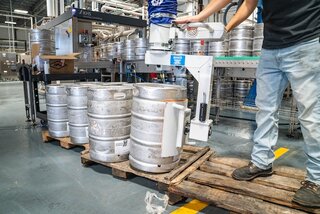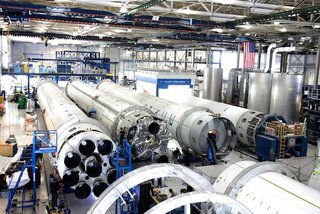Over 1.5 million jobs are available in the aluminum job market. The industry is highly significant to the global economy because it contributes products for different applications. Because of this, the industry provides many employment opportunities worldwide.
According to the Aluminum Association, the industry employs about 159,000 people in the United States alone. It also supports 672,000 jobs in supplier and downstream industries. This sector will continue growing in the next 10 years, with a growth rate of 6.5% from 2021 to 2028.
Overview of the Aluminum Job Market
Aluminum is a lightweight, strong, and corrosion-resistant metal, which makes it an excellent choice for different companies. The aluminum job market works with mining, refining, and production businesses. The industry dates back to the late 19th century when the process for bauxite was first developed.
The industry originally grew because of the demand for aluminum in the construction of airplanes during the First World War. Additionally, the value of the aluminum market is significant, with $200 billion in revenue. The market will keep growing due to increasing demand from emerging economies and the trend toward lightweight and fuel-efficient vehicles.
10 Most Common Available Jobs in the Aluminum Industry
The aluminum industry is essential to the global economy and provides materials for different products. As a result, there is a high demand for skilled workers in the aluminum industry. Knowing the most common jobs in this sector will make your decision faster.
1. Maintenance Manager
Average Annual Salary: $159,049

A maintenance manager manages maintenance and repair services for complex electrical and mechanical production equipment and systems. They check equipment for effectiveness, safety, and performance and also create and implement standard processes. To fulfill work orders with the least amount of downtime, they oversee maintenance personnel, supplies, and activities.
Maintenance managers possess a good understanding of maintenance machinery and equipment, outstanding communication skills, and leadership abilities. They also can manage projects and budgets with knowledge of production plants, assembly machines, pipe repairs, and electrical repairs.
Many companies require a bachelor’s degree in engineering, administration, or facility management for this role. Some employers also request a minimum of 5–10 years of experience in a supervisory role.
According to Salary.com, this position has a growth rate of 7% from 2018 to 2028. This role will also produce many employment opportunities in the next 10 years.
2. Logistics Manager
Average Annual Salary: $107,000
A logistics manager oversees storage and distribution operations in the warehouse. Also, they develop, implement, and maintain effective outbound shipping processes, receiving processes, and inventory control. Additionally, they ensure compliance with all requirements and identify opportunities to improve.
Logistics managers possess knowledge of logistics and supply chain management and experience in the aluminum industry. They should have strong communication, problem-solving, and analytical abilities.
Many companies require at least a bachelor’s degree in logistics, supply chain management, or a related field for this role.
The job outlook for logistics managers is positive, with a growth rate of 4% from 2019 to 2029. The logistics sector will continue to produce employment opportunities as e-commerce and globalization increase.
3. Process Engineer
Average Annual Salary: $105,000
A process engineer develops and improves manufacturing processes to increase efficiency, reduce costs, and improve product quality. They also work with other engineers to identify areas for improvement and develop solutions to problems.
Process engineers must possess technical, analytical, and excellent computer skills. Also, they must know process-related standards and have experience in process engineering.
Many employers require a bachelor’s degree in engineering or a related field for this role. However, some employers prefer applicants with a master’s degree or relevant work experience.
The job outlook for process engineers is positive, with a growth rate of 4% from 2019 to 2029. It will produce many employment opportunities in the future.
4. Materials Scientist
Average Annual Salary: $95,127
Materials scientists develop and improve the properties of aluminum alloys used in different applications. They also conduct research, analyze data, and develop new materials and processes.
A materials scientist must have strong analytical, communication, and problem-solving skills. Also, they need a solid understanding of materials science, chemistry, and physics.
To become a materials scientist in the aluminum industry, you need a bachelor’s degree in materials science, metallurgy, or a related field. Although some employers require a master’s or doctoral degree for executive positions.
According to the Bureau of Labor Statistics, the job outlook for this role is positive and will grow by 6% from 2021 to 2031. This position will produce many jobs in the next 10 years.
5. Research and Development Engineer
Average Annual Salary: $94,000

A research and development engineer conducts research toward new or improved products and processes. They also derive designs for experiments and oversee the production and analysis of newly designed materials and alloys.
Research and development engineers possess critical and analytical thinking, collaboration, problem-solving, and technical design abilities.
To get this role, you need a bachelor’s degree in engineering or a related field. Some employers prefer candidates with a master’s degree in any related field and years of experience.
The job outlook for research and development engineers is positive. The Bureau of Labor Statistics projects a 3% growth from 2020 to 2030. Currently, there are 253 jobs available for this role in the aluminum sector. This position will also produce employment opportunities in the next 10 years.
6. Environmental Health and Safety Manager
Average Annual Salary: $91,448
An environmental health and safety manager ensures that the company complies with environmental regulations and safety standards. They develop and implement tactics to minimize the risk of accidents and injuries in the workplace. Additionally, they conduct audits and inspections to identify potential hazards and recommend corrective actions.
Environmental health and safety managers must have both technical and soft skills. They must possess extensive knowledge of environmental regulations and policies and analytical and problem-solving abilities. Soft skills are business, collaboration, instructional, interpersonal, and communication skills.
To get this role, you need a bachelor’s degree in environmental science, occupational health, and safety, or a related field. Some employers prefer candidates with a master’s degree in a related field.
The job outlook for environmental health and safety managers is positive, with a 5% growth rate by 2028. There are currently 76,277 job openings for this role in the US job market. This position will also produce many employment opportunities in the next 10 years.
7. Production Supervisor
Average Annual Salary: $81,000
A production supervisor oversees the manufacturing processes of aluminum products. They also organize and manage the production team and ensure that production targets are met. Also, they make sure their products maintain quality standards.
Production supervisors must have experience using different manufacturing machinery and tools. They must know about lean manufacturing and safety procedures and the ability to identify and solve complex problems.
11.1% of production supervisors hold a bachelor’s degree. Some employers require a minimum of 3 years of experience as a team leader or supervisor in manufacturing.
The job outlook is positive, with a growth rate of 3% from 2021 to 2023. This role will produce about 15,400 openings every year for the next 10 years.
8. Sales Representative
Average Annual Salary: $71,063
A sales representative makes sales, develops direct business relationships, and contacts end-market customers to sell aluminum scrap. They also develop and locate applications for special products, services, or new products.
Sales representatives must have strong communication and interpersonal skills and sales experience. They must also know the aluminum industry and problem-solving and decision-making abilities.
A high school diploma or equivalent is the basic educational requirement for this role. However, many companies require a bachelor’s degree in business or a related field.
The Bureau of Labor Statistics projects a 2% growth rate from 2019 to 2029 for the employment of sales representatives. It will also produce many jobs in the future due to the high demand for individuals who can market and sell products.
9. Aluminum Production Operator
Average Annual Salary: $70,200
An aluminum production operator operates and maintains equipment used in the production of aluminum. They also set up, monitor, and ensure that the factory’s equipment functions efficiently and that all procedures work correctly.
Aluminum production operators must possess communication, coordination, mechanical, and problem-solving abilities. They must also have strength, stamina, and knowledge of hand and power tools, blueprint reading, and assembly lines.
The basic educational requirement for this role is a high school diploma or equivalent. However, some employers prefer candidates with an associate’s degree in a related field.
The job outlook for aluminum production operators will decline by 4% from 2019 to 2029 due to automation and technological advancement. This role will produce fewer jobs in the next 10 years.
10. Industrial Electrician
Average Annual Salary: $68,000

An industrial electrician performs different functions related to electrical controls, equipment, and wiring in an industrial plant or worksite. They test, troubleshoot, install, and repair electrical components. They also read and interpret blueprints and specifications and stay current on electrical code specifications for the area.
Industrial electricians must know how to troubleshoot problems, read blueprints and specifications, and install, service, and repair conduits. They must be able to work with electrical controls and equipment with knowledge of hand tools, pneumatics, wiring, and schematics.
The basic educational requirement for this role is a high school diploma or GED. Most employers want individuals who have completed a 4- to 5-year apprenticeship program.
The job outlook for this role is positive, with a 10% growth rate from 2018 to 2028. There are currently 48,589 job openings for this position.
5 Most Common Available Entry-Level Jobs in Aluminum
For individuals who are just starting, many entry-level job opportunities are available in this industry. These entry-level jobs allow you to gain experience and knowledge in the aluminum industry.
1. Extrusion Operator
Average Annual Salary: $42,793
 An extrusion operator in the aluminum industry sets up and operates an extrusion machine to produce aluminum products such as rods, tubes, and bars. They read and interpret blueprints and diagrams to select, position, and secure machinery, adjust and clean machines, and document work.
An extrusion operator in the aluminum industry sets up and operates an extrusion machine to produce aluminum products such as rods, tubes, and bars. They read and interpret blueprints and diagrams to select, position, and secure machinery, adjust and clean machines, and document work.
Extrusion operators must have experience with extrusion, mechanical skills, hand tools, mechanical skills, and problem-solving abilities. Also, they need practical abilities, attention to safety, and the ability to work in a team environment.
Many employers require a high school diploma or equivalent and on-the-job training. However, many companies prefer candidates with experience in manufacturing or machine operation.
The job outlook for extrusion operators is positive, with a growth rate of 3% from 2020 to 2030. This growth will produce around 1,200 new jobs in the field.
2. Assembler
Average Annual Salary: $36,000
An assembler puts aluminum products together using hand tools or machines. They do this using their understanding of schematics and blueprints.
Assemblers must possess technical knowledge and the ability to read blueprints and drawings. They must also know how to use clamps and other hand tools.
Employers require a high school diploma for this role. Also, many companies offer on-the-job training. The job outlook for assemblers is stable. This job will produce fewer jobs in the future due to technological advancement and robots.
3. Warehouse Associate
Average Annual Salary: $34,000
Warehouse associates process, package, and ship orders accurately, organize stocks and maintain inventory. They also inspect products for defects, pull orders, fulfill product order invoices, and monitor inbound and outbound shipments in the facility.
A warehouse associate must be able to operate forklifts, hand trucks, pallet jacks, and other warehouse equipment. They should also possess knowledge of warehouse data systems, organizational skills, and the ability to lift heavy products.
Many employers do not require any educational qualifications for this role. However, they prefer individuals with a good record of warehouse management.
The job outlook for warehouse associates is positive, with a 4% growth rate from 2020 to 2030. This role will produce many employment opportunities in the future.
4. Material Handler
Average Annual Salary: $33,215
A material handler moves, handles, and stores various materials in a warehouse or production facility. They pull and verify materials and supplies on production orders while maintaining in-process inventory at work centers.
Material handlers need basic computer skills, an understanding of Microsoft Office and email, and the ability to keep precise records. They also possess attention to detail, and physical strength, and are reliable and fast on their feet.
The educational requirements for a material handler depend on the company. Most employers require a high school diploma or equivalent and short-term on-the-job training. Others need forklift certification or experience operating heavy machinery.
The job outlook for material handlers is positive, with a 6% growth rate from 2021 to 2031. There are presently 6,473,000 handlers working in the United States. This role will produce many jobs in the future.
5. Machine Operator
Average Annual Salary: $30,750
 A machine operator sets up, adjusts machines according to blueprints, and monitors machine status to ensure proper functioning. They also insert materials into machines, operate shaping and forming equipment, and adjust machine settings.
A machine operator sets up, adjusts machines according to blueprints, and monitors machine status to ensure proper functioning. They also insert materials into machines, operate shaping and forming equipment, and adjust machine settings.
Machine operators must possess a strong understanding of the machines they work with and knowledge of diverse high-speed machinery. Additionally, they need to know about measurement tools like calipers and micrometers.
Many employers hire individuals with a high school diploma for this role. Some prefer candidates with experience in labor, landscaping, or machine operation.
The job outlook for machine operators in the aluminum industry will decline by 4% from 2019 to 2029. This decline is due to automation and the use of robots. This role will produce very few jobs in the future.
What is the Job Description of an Aluminum Professional?
People who work in the aluminum sector play vital roles in the manufacturing, fabrication, or installation of aluminum products. Also, they have expert knowledge and skills in judging the quality and durability of the finished products.
5 common duties and responsibilities of employees in the aluminum industry include:
1. Designing and creating aluminum products based on client specifications
Aluminum professionals interpret and implement client specifications and drawings to create accurate and functional designs. They also have a good understanding of the properties and characteristics of different aluminum alloys. Additionally, they know how to use them to create specific products.
2. Cutting, shaping, and forming aluminum materials
They use different cutting and shaping tools, like saws and drills, to cut and shape aluminum materials into the desired dimensions and shapes. Workers in this sector also know diverse techniques for forming aluminum materials.
3. Joining and welding aluminum parts
Aluminum professionals use various welding techniques to join aluminum parts together to create a strong and durable finished product. They have a good understanding of the properties and behavior of aluminum during the welding process. They can select the appropriate welding technique based on the type and thickness of the aluminum.
4. Installing aluminum products
Aluminum professionals possess the ability to interpret building plans and install aluminum windows, doors, and frames in various settings. Employees in this sector work safely at heights, use proper tools and equipment, and ensure that finished products function correctly.
5. Maintaining and repairing aluminum products
Aluminum professionals maintain and repair existing aluminum products to ensure they continue to function over time. They do this with their understanding of the properties and characteristics of aluminum.
How to Apply and Get a Job in Aluminum?
The aluminum industry offers good job opportunities for individuals with relevant skills and knowledge. However, to secure a role, you need good strategies to increase your chances of landing one.
5 solid steps to landing a job in the aluminum industry:
1. Research the industry
Before seeking to work in aluminum, you need a good understanding of the industry, including the different types of products, materials, and techniques they use. You can do research online, attend industry events, or talk to professionals in the field to learn more.
2. Acquire the necessary skills and knowledge
To work in the aluminum industry, you need to acquire specialized skills and knowledge in certain areas. You can gain these skills through vocational or technical training programs, apprenticeships, or on-the-job training.
3. Build a strong resume and portfolio
To stand out in the competitive job market, you will need a strong resume that highlights your skills and experience working with aluminum. You can also create a portfolio of your work, including design plans, fabrication projects, and installation photos, to showcase your abilities and expertise.
4. Network with professionals in the industry
Build connections with professionals in the aluminum industry. It is a good way to learn about job openings, gain insights into the industry, and get advice. You can attend industry events, join professional organizations, or reach out to companies through social media or email.
5. Apply for jobs and prepare for interviews
Once you know the job opportunities that match your skills, submit your resume and portfolio and prepare for interviews. Do well to research the company and the role before the interview. It will help you prepare answers to common interview questions.
How to apply and get an entry-level job in Aluminum?
Getting a job in the aluminum industry can be a rewarding experience, but many find it difficult to get into an entry-level position. With the right skills, knowledge, and approach, you can increase your chances of landing a role in the industry.
5 basic steps to get an entry-level job in aluminum:
1. Gain relevant technical skills
You need basic knowledge of technical skills relevant to the industry to get an entry-level role. Familiarity with welding, machining, and fabrication is essential. You can acquire these skills by registering for vocational or technical training programs, apprenticeships, or internships.
2. Develop hands-on experience
Hands-on experience is highly pertinent in the aluminum industry. You can gain practical experience through internships, co-op programs, or volunteer work. It will help you build your skills and network with professionals in the industry.
3. Research the industry
Before you apply for jobs, research the aluminum industry and understand the different positions available. It will help you identify the specific skills and knowledge you need for each position. Additionally, it will be a guide for tailoring your resume and cover letter accordingly.
4. Create a strong resume and portfolio
You must use your resume and portfolio to showcase your skills, experience, and qualifications to potential employers. Highlight your relevant technical skills and hands-on experience, and include any related coursework or certifications you have.
5. Apply for entry-level positions
Once you have the necessary skills and experience, apply for entry-level positions in the aluminum industry. Look for job openings online, through industry associations, or referrals from your network.
Additional tips for finding available jobs in aluminum
1. Be willing to start at the bottom
Entry-level jobs in the aluminum industry are not always glamorous. However, they can provide valuable experience and a foot in the door. Be willing to start at the bottom and work your way up.
2. Be persistent
Getting an entry-level job in the aluminum industry is sometimes difficult. It is important to be persistent and keep applying for jobs even if you do not get one immediately. Also, take reaching out to companies directly to inquire about job opportunities into consideration.
3. Keep learning and growing
The aluminum industry evolves with new technologies and techniques. To stay competitive and develop yourself, keep learning and growing. Whether through continuing education, industry certifications, or on-the-job training, do not relent.
Which aluminum job is easy to get?
Assembler, warehouse associate, and machine operator are the easiest jobs because they require low educational requirements.
What is the hardest aluminum job to get?
Materials scientists, research and development engineers, and process engineers are the most difficult. It is because they require a high level of education, specialized knowledge, and complex problem-solving abilities.
What are the Educational Requirements and Training for Aluminum Jobs?
Many job opportunities are available in this sector, from entry-level positions to advanced technical and managerial roles. Depending on the role you want, specific educational requirements and training programs are necessary to qualify. These qualifications will help you to get the best paying jobs too.
3 key educational requirements for aluminum jobs:
1. High school diploma or equivalent
Many entry-level positions in the aluminum industry require a high school diploma or equivalent, such as a GED. This educational requirement demonstrates basic knowledge and skills in math, science, and communication.
2. Associate’s degree in a related field
Many technical positions, like machine operators, require an associate’s degree in welding technology or mechanical engineering. These degree programs provide students with relevant skills and knowledge in materials science, metallurgy, and industrial safety.
3. Bachelor’s degree in engineering or business
Advanced technical or executive roles in the sector require a bachelor’s degree in engineering or business. It provides students with a deeper understanding of the principles and practices of aluminum production. If you want to build a long-term occupational life in this sector, you should consider getting this degree.
5 training and certifications that are relevant to the aluminum sector:
1. Aluminum Extrusion Design Manual Certification
The Aluminum Extruders Council (AEC) offers this certification for specialists in the design and specification of aluminum extrusions. To obtain it, applicants must pass an exam that covers aluminum alloy selection, extrusion process variables, and quality control.
2. Certified Aluminum Welding Inspectors (CAWI)
This certification is from the American Welding Society (AWS). They offer it to individuals who are into welding. You must pass exams on welding symbols, weld joint design, and inspection techniques for the certificate.
3. Occupational Safety and Health Administration (OSHA) 10-Hour General Industry Training
This training program teaches workers about safety hazards in the workplace and how to avoid them. It covers hazard communication, personal protective equipment, and machine guarding. Also, it is globally recognized.
4. Certified Production Technicians (CPT)
The Manufacturing Skill Standards Council (MSSC) teaches this program to individuals who work in the manufacturing industry. It is a good training program for people who want to work in the aluminum sector.
5. Lean Six Sigma Certification
Various organizations offer Six Sigma Certification training. The program teaches workers how to improve efficiency and quality in manufacturing processes. It has global recognition for individuals working in manufacturing, including the aluminum industry.
Where Do I Find Aluminum Jobs?
Finding job openings in this industry is tiring, especially when you do not know where to look. Discovering the best places to find employment opportunities and connect with potential employers will make things easier for you.
Top 5 job boards to find aluminum jobs:
1. Aluminum Association Job Board
The Aluminum Association is a trade association for the North American aluminum industry. It has a job board that lists job openings at member companies. You can use this to find jobs by location, job title, and company.
2. Aluminum Insider Jobs
In addition to providing news and information on the worldwide aluminum industry, Aluminum Insider has a job listing column with openings in production, engineering, and management.
3. CareerCast Niche Networks
CareerCast is a job listing site that offers niche networks for the aluminum industry and other sectors. You can use it to find jobs in production, engineering, sales, and other areas of the industry.
4. Metal Jobs Network
Metal Jobs Network specializes in jobs in the metalworking industry. Job hunters will be able to submit their resumes for companies to view.
5. International Aluminum Institute (IAI) Job Board
The International Aluminum Institute is a global organization that promotes the sustainable production and use of aluminum. The IAI job board lists employment opportunities in production, engineering, and management. Job seekers can employ this platform for their search.
What are the Skills Needed to Get a Job in Aluminum?
The aluminum industry requires a diverse set of skills and qualifications. Developing them in your job search and applications will increase your chances of landing a job in this field.
5 essential skills needed to get aluminum jobs:
1. Quality control
The aluminum sector needs individuals who are experts in quality control. Ensuring that products meet strict quality standards is essential in the aluminum industry. Also, workers should know how to identify and address quality issues as they arise.
2. Analytical skills
Analytical skills are important in many roles in the aluminum industry. Employees must be able to analyze data and other information to identify trends, track performance, and make informed decisions. It influences the success of the companies.
3. Technical knowledge
A solid understanding of the technical aspects of aluminum production is important. Workers must know the equipment, processes, and quality control. They are all essential for many roles in the industry.
4. Problem-solving
The aluminum industry can be complex, sometimes with challenges and problems. Employees must be able to think critically and creatively to identify and implement effective solutions.
5. Teamwork
Teamwork is crucial in the aluminum industry. Workers must collaborate across departments and roles to achieve common goals and objectives. Working effectively as part of a team, communicating clearly, and sharing information and knowledge are necessary for success in this field.
What are the Factors Affecting the Availability of Jobs in the Aluminum Sector?
The availability of jobs in the aluminum sector can be affected by various factors. Understanding these factors will help job seekers make informed decisions about their jobs. It will also increase their chances of finding employment in the sector.
5 critical factors affecting the availability of jobs in the aluminum industry:
1. Economic Condition
The aluminum industry is heavily influenced by economic conditions. It can negatively impact the availability of jobs. It can fluctuate due to global demand, the price of raw materials, and trade policies. During economic downturns, companies reduce production and cut jobs to remain competitive.
2. Technological Advancements
The aluminum industry is evolving, with new technologies and processes. As a result, jobs in the industry will require different skill sets and qualifications than in the past. Workers who cannot adapt to these changes will find difficulty in securing employment in the sector.
3. Consumer Demand
The demand for aluminum products can impact the availability of jobs in the sector. Changes in consumer preferences and purchasing habits can lead to shifts in production and employment. Some companies might expand their operations to meet demand, while others might cut back to remain in business.
4. Industry Reputation
The reputation of the aluminum industry can also impact the availability of jobs. Negative publicity around environmental or labor issues can make it difficult for companies to attract professional workers. It can lead to a shortage of qualified candidates for open positions.
5. Industry specialization
There is a high level of specialization in the aluminum sector, with different companies focusing on aspects of the production process. Job seekers with expertise in a particular area will find it easier to secure employment with companies that require those skills. Also, those with more general skills will find it harder to stand out in the job market.
Conclusion: How Many Jobs are Available in Aluminum?
The aluminum sector is a significant employer, with diverse job opportunities across various sub-sectors. The industry will continue to grow and create new job opportunities in the coming years. However, technological advancements, global demand, and industry competition can impact the availability of jobs. Individuals interested in the industry should consider obtaining relevant education and training. They should also develop the necessary skills to increase their chances of securing a job in the aluminum sector.
FAQs: How Many Jobs are Available in Aluminum?
How many job positions are there in aluminum?
The aluminum industry has job positions available across various sub-sectors, including production, engineering, research and development, sales, and management.
What is the most common job in aluminum?
Aluminum production operator, process engineer, materials scientist, sales representative, and logistic manager are the most common aluminum jobs.
Are there a lot of jobs in aluminum?
Yes. According to the Aluminum Association, the aluminum industry directly employs over 162,000 people in the United States alone, with 700,000 jobs supported indirectly by the industry.
Are aluminum easy?
Yes, aluminum jobs are easy.
What is the most difficult aluminum jobs?
Research and development engineers, process engineers, and sales representatives have the most difficult jobs. Because they are under pressure to create new products, meet targets, and generate revenue for the company.








